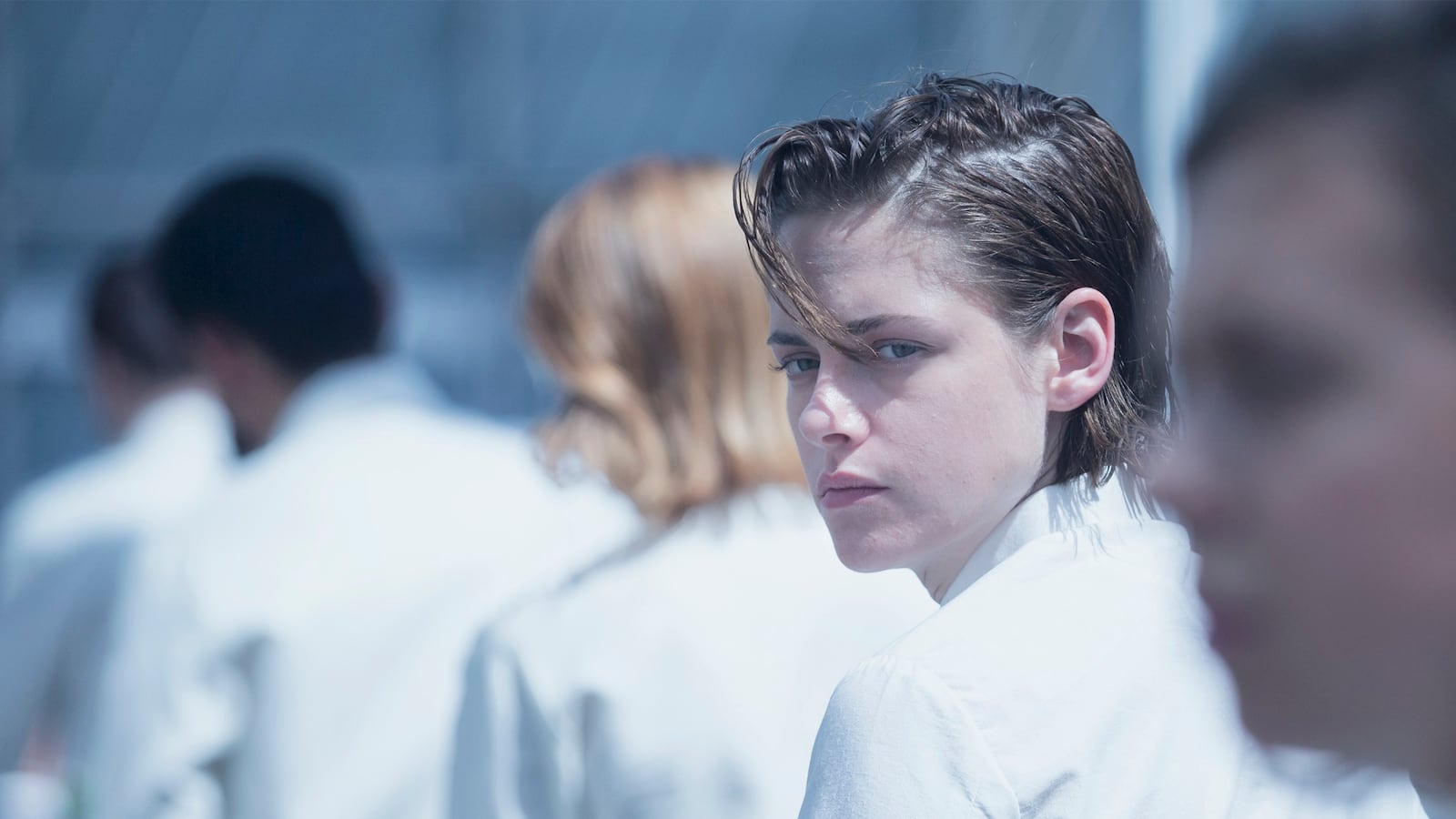It’s been four years since filmmaker Drake Doremus unveiled his sophomore feature, Like Crazy, to critical bouquets at the 2011 Sundance Film Festival. Shot on a Canon 5D for $250,000, it was a tale of young love won and lost between a fetching British exchange student and a budding Los Angeles architect, whose union struggles to withstand a gulf the size of the Atlantic. These days, Doremus’s microfeature is most notable for helping propel two of the world’s finest female acting talents, Felicity Jones and Jennifer Lawrence, into the big leagues.
Four years—and three Oscar nods between those gals—later, the resourceful director is back with another allegory of love, only this time operating on a grander, more operatic scale, and with two established stars navigating the treachery of what Balzac once described as “equal and pure, without violent demonstrations.”
Equals, making its world premiere at the 2015 Venice Film Festival, a city that knows a little something about love, is set in a dystopian society ravaged by “The Great War”—a cataclysmic event that saw 99.6 percent of the earth destroyed by a symphony of bombs. The remaining livable surfaces are the Peninsula, home to “Defects” that are “ruled by emotions,” and a neu-civilization called the Collective where emotions and human contact are forbidden, and sex, or “coupling,” will earn you a trip to the Defective Emotional Neuropathy (DEN) facility, where you’ll be reprogrammed and/or subjected to a “pain-free death scenario.”It’s essentially an emotional concentration camp where those who begin to experience the faintest whiff of emotion are diagnosed with Switched On Syndrome (SOS), given a prescription of inhibitors, and know that a trip to the DEN is just around the corner.
All the denizens of the Collective march about in white Nehru suits, go to work in state of the art facilities, and return home to their minimalist white apartments. It’s a bleak blue world reminiscent of Gattaca, where the chic sheep invest all their desires in the possibilities of space travel, and people are reduced to glass cases of emotion ready to shatter at a moment’s notice—in the form of plummeting to their own death.
Silas (Nicholas Hoult) is an illustrator at the coveted Atmos corporation, working alongside the gifted writer Nia, played by Kristen Stewart. One day, they witness one such suicide victim, and Silas notices Nia react to the dead body, hands clenching, eye quivering. It has a profound effect on him, and he soon begins experiencing a whole range of emotions toward her—admiring her face and features, drinking in audio recordings of her voice, and following her around the futuristic campus.Doremus’s cinematographer/pal John Guleserian captures Silas’s longing for Nia through a series of sensual shot/countershot close-ups of Stewart, from her hands to her visage, which photographs in close-up better than any other actress’s in the game—and can communicate more with a glance than most actors can with a dozen pages of dialogue—and Hoult, who, with his Vulcan eyebrows, sharp cheekbones, and baby blues, gives her a run for her money. The camera loves these two young stars, and celebrates every inch of their striking faces.

Once he’s diagnosed with SOS, Silas becomes persona non grata, but his desire for Nia doesn’t wane, resulting in an erotic bathroom stall confrontation that is, with all due respect to bed-breaking vampire coitus, the most erotic scene Stewart and Hoult have partaken in to date. It begins with them staring at each other in the blue-lit stall—they must have chosen the handicapped one, because it’s huge, or maybe in the future we’ve grown to appreciate a nice, big bathroom—tracing every inch of the other with their eyes. Then their hands slowly touch, one finger coiling into the others. Hands run down bodies, from the face and lips to the chest and hips. And, with the lo-fi music crescendoing into the stratosphere, their lips meet. If that all sounds a bit absurd on paper, it should, but with the talents at hand here, from the lush lensing to the shot selection to the acting, it will elicit pleasant chills.
The two are now in love, and gleefully partake in all the things that first lovers do—staying late after work, sneaking over to the other’s apartment, taking showers together, sharing their intimate thoughts, and engaging in plenty of sex. Due to their emotional dormancy, Silas and Nia are now full-body erogenous zones, and act on this accordingly.
You can tell where this is going, and along their journey to self-enlightenment, they come across a pair of older “Defects” operating a support group for those with the feels, played by the brilliant Aussie actors Guy Pearce and Jacki Weaver. And the world they inhabit, thanks to tight scripting by Nathan Parker—who wrote the vastly underrated sci-fi film Moon—the lensing, with shifts from blue to warmer colors as their relationship heats up, and the architectural scenery employed, from Singapore’s Marina Barrage to its Henderson Waves bridge, gives the film a believably futuristic look. Doremus, too, knows how to capture two young souls caught in the chaos of love, charting an emotionally stirring journey.But this film is mostly a celebration of its two young, attractive stars, who’ve both swam in these forbidden love waters before, with Stewart’s fangbanger in Twilight and Hoult’s lusty zombie in Warm Bodies, and whose delicate features imbue the film with heightened sensuality. This is one erotic movie, which in today’s romanceless Hollywood, is quite the accomplishment.






